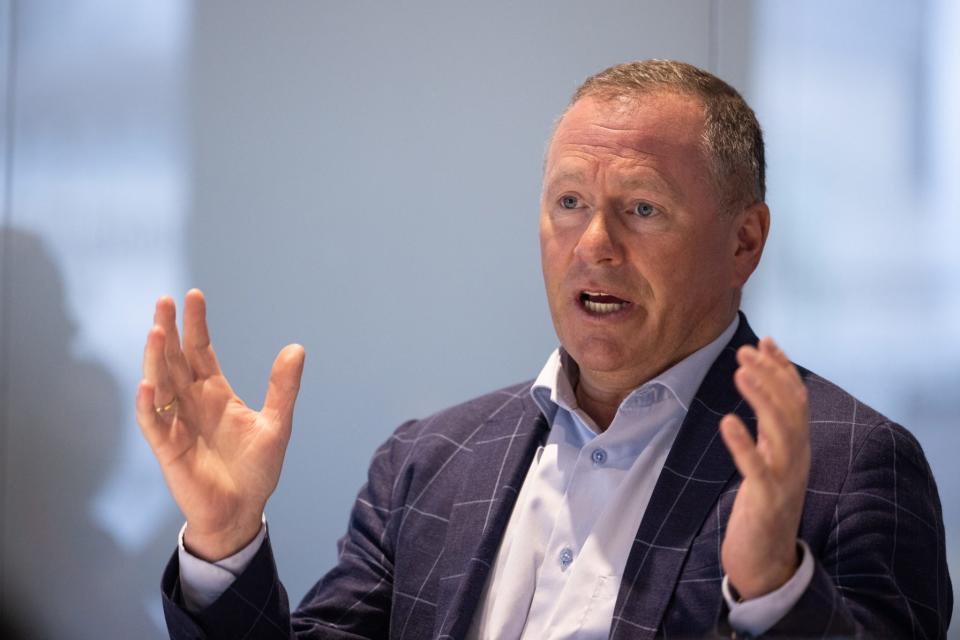Norway’s $1.6T oil fund CEO—who said Americans work harder than Europeans—has a countdown in his office to show how many days he has left on the job

Time is money, or so the saying goes, and the CEO of the world’s largest sovereign wealth fund is making sure every day counts—he’s even got a calendar countdown in his office to prove it.
Nicolai Tangen leads Nordic behemoth Norges Bank Investment Management, which governs the revenue earned by Norway’s oil and gas resources, with the aim of ensuring its benefits are distributed fairly between current and future Norwegian generations.
Akin to a presidential cycle, the CEO role of the $1.6 trillion fund runs on a five-year contract, which can be renewed.
As a result Tangen knows down to the day when his tenure will end, and added a large countdown in his office which ticks down every day.
“I’ve got 580 days left,” Tangen told the 20VC podcast earlier this year. “Now why do I have that? Is it because I don’t like my job? No. I love my job.
“But the thing is that when I get somebody in my office who says, ‘Yeah, we can do this over the next three months,’ I say: ‘Hey, look at this. I got 580 days left, we need to hurry up.’”
Tangen said this tool “completely changes the mindset” of his colleagues, adding: “They say: ‘Oh yeah, oh gosh, you only have 580 days left—we need to do it straight away.’ You get this urgency into thinking.”
The civil servant, who took over the top job in 2020, has indicated in the past he wants more out of his European colleagues. Tangen told the Financial Times in April: “We are not very ambitious. I should be careful about talking about work-life balance, but the Americans just work harder.”
Tangen, Norway’s so-called trillion-dollar man, added on 20VC that having a dynamic workforce is the difference between success and failure. “Organizations which make fast decisions are generally better,” he added.
Work-life balance
Norges Bank Investment Management is one of the most powerful financial vehicles on the planet: It is the world’s largest single owner of global stock markets, controlling 1.5% of shares in the world’s listed companies.
As a result, its leader has access to some of the biggest names in business, including Nvidia founder and CEO Jensen Huang.
The boss of the AI-chip maker and Tangen discussed work-life balance, with the former—who is a notoriously hard worker and perfectionist—saying he virtually never stops working.
Tangen explained: “[Huang] said: ‘Nicolai, there is hard work, and there is insane hard work … I do insane hard work.’ I asked, ‘But when do you relax?’ [Huang] said: ‘I relax all the time, because I love what I do.’
“I think, if you really love what you do, it’s not going to feel like work. I set aside time for [my wife and kids],” Tangen added. “But I work because I love what I do.”
Move fast but think long term
Despite Tangen’s clear work drive and push for operational speed, as the guardian of Norges Bank Investment Management, the CEO has to think in the long term about the performance of the vehicle for generations to come.
“Time is really interesting, and I think it’s really funny,” Tangen said. “Let’s say you are 20 years old, you are in such a hurry. Three months is an eternity.
“You get older … Suddenly, I am so patient. Why? I haven’t got that many years left compared to a 20-year-old, yet I’m much more patient than these young people. It makes no sense.”
Tangen continued: “Why are you more impatient when you’re 20? Three months is a higher percentage of your life than when you’re 50.”
By 50, “you’ve seen it pays off to be long term,” Tangen explained. “If I could tell my 20-year-old self something … it would be: ‘You’ve got so much time. Think more long term.’”
Norges Bank Investment Management has indeed been rolling out a longer-term move over the past 10 years: leaning more into the U.S. After all, America is home of the “Magnificent Seven” stocks that have provided a backbone to the stock market boom and, according to analysts, will continue to do so.
Investments in the U.S. now represent 46.9% of Norges Bank’s portfolio, whereas a decade ago the U.S. represented just under 30%. Going back a further 10 years, in 2003, the organization’s investment in America made up just 26.3%.
Conversely, in 2003, 59.5% of Norges Bank’s portfolio was invested in European countries, a figure that, by 2023, had fallen to 28.7%.
This story was originally featured on Fortune.com
